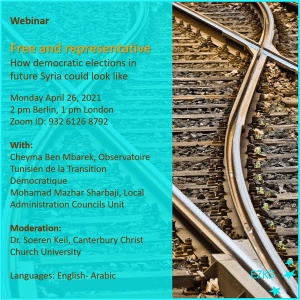Soon, there will be presidential elections in Syria. No surprises are expected, the results are already set. Democratic elections, however, are less calculable and they offer more political options. Citizens have the opportunity to actively participate in decision-making by voting or may even run for the parliament or other political positions. What are further characteristics of democratic elections? How can free and representative elections be implemented in future Syria? What can we learn from the experiences of other countries?
These and other questions will be discussed in our next webinar “Free and representative – What democratic elections in future Syria could look like” by:
Mohamad Mazhar Sharbaji, Local Administration Councils Unit
Cheyma Ben Mbarek, Observatoire Tunisien de la Transition Démocratique
Moderation: Dr. Soeren Keil, Canterbury Christ Church University
Date: April 26, 2021, 2pm Berlin time / 1pm London time / 3pm Damascus / Istanbul time
Zoom Link: https://zoom.us/j/93261268792
Languages: Arabic-English
Video
Speakers
Ben Mbarek, Cheyma
Cheyma Ben Mbarek is a medical student active in civil society organizations focusing on civic engagement. Due to her work with Al Bawsala and the Tunisian Observatory for Democratic Transition (OTTD), she has expertise in the fields of local administration, decentralisation, transparency and human rights. In order to deepen her understanding of legal topics, she took Masterclasses in law at the Faculty of Legal, Political, and Social Sciences of Tunis. She is currently working as a MEAL officer with Médecins du Monde Belgique – Tunisia mission.
Sharbaji, Muhammad Mazhar
Muhammad Mazhar Sharbaji is from Daraya in the rural area of Damascus. He received a BA in Architecture in 1985 and a Postgraduate Diploma in Urban Planning from Damascus University in 1988. Muhammad Sharbaji worked in the General Society for Studies and Technical Consulting in Damascus until 1992 and then in the private sector in the fields of training, supervision and engineering. Sharbaji was also active in the Syrian Engineers Syndicate and held the position of head of the Department of Engineers Syndicate in Daraya from 1994 to 2012. From 2003 to 2005 he was chairman of the Daraya City Council (Damascus country) and from 2013 to 2014 he worked in the Department of Local Councils, Department for Elections and Education of Local Councils. From 2014 to the end of 2016 he was an electoral director in the interim Syrian government. From 2017 until today he works in the Local Administration Councils Unit (an independent civil society organization) as Director of Governance and Capacity Building. Moreover, he is a trainer specialized in the fields of elections, local administration, decentralization, community initiatives, and social capital. Mazhar Sharbaji has participated in numerous local, regional, and international conferences.
Moderation
Keil, Soeren
Dr. Soeren Keil researches and teaches at the Canterbury Christ Church University in Great Britain. He previously worked at the University of Pompeu Fabra (Spain), the Center for European Education in Nice (France), the University of Graz (Austria), the Free University of Berlin (Germany) and the University of Passau (Germany). He has advised numerous governments and non-governmental organizations, particularly on issues relating to the Western Balkans, and also advises private companies and think tanks. Among other things, he researches “Institutional design in post-war societies with a special focus on federalism and forms of territorial autonomy”.
You can have information on our other events by visiting our Events page.


